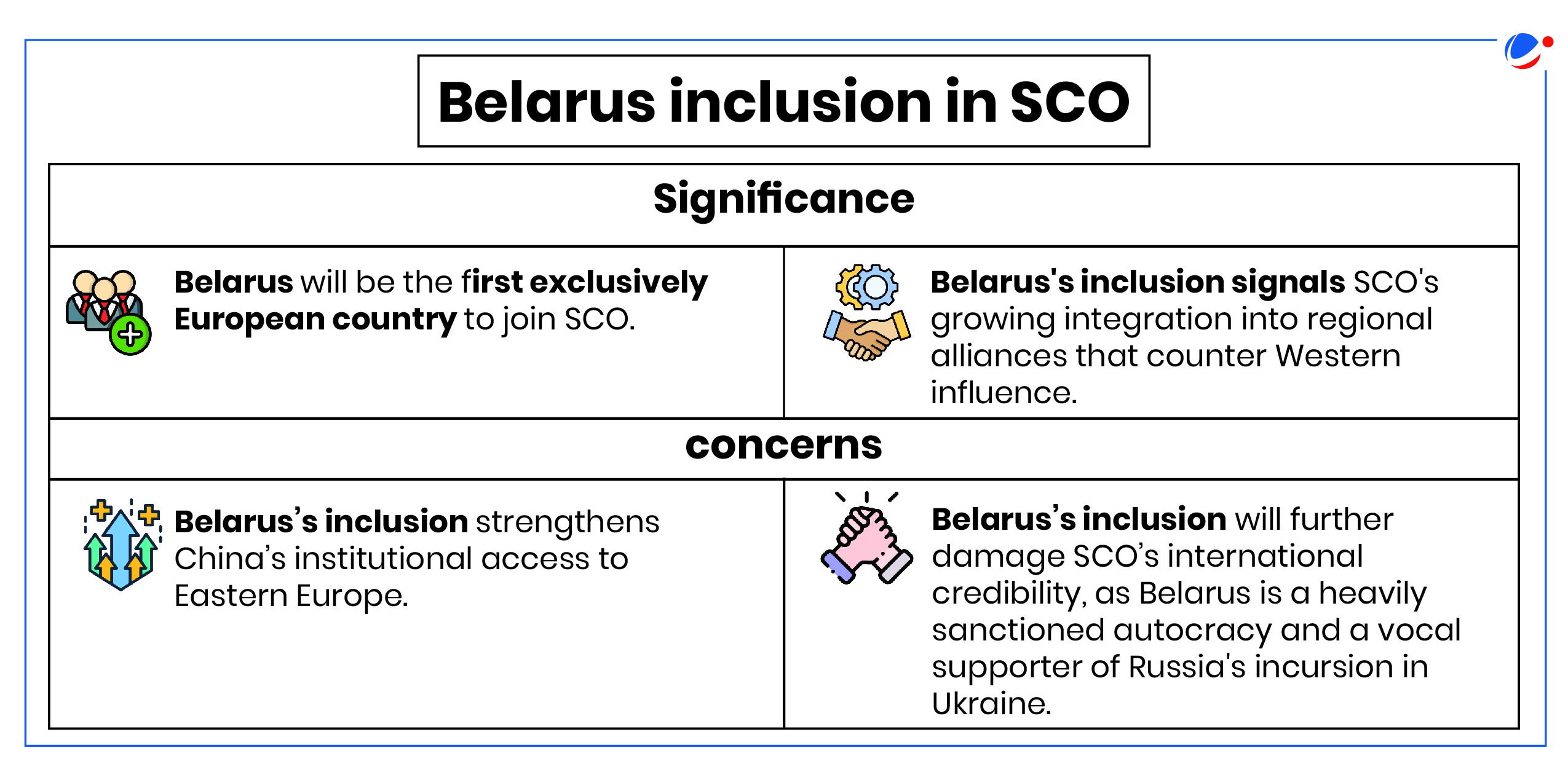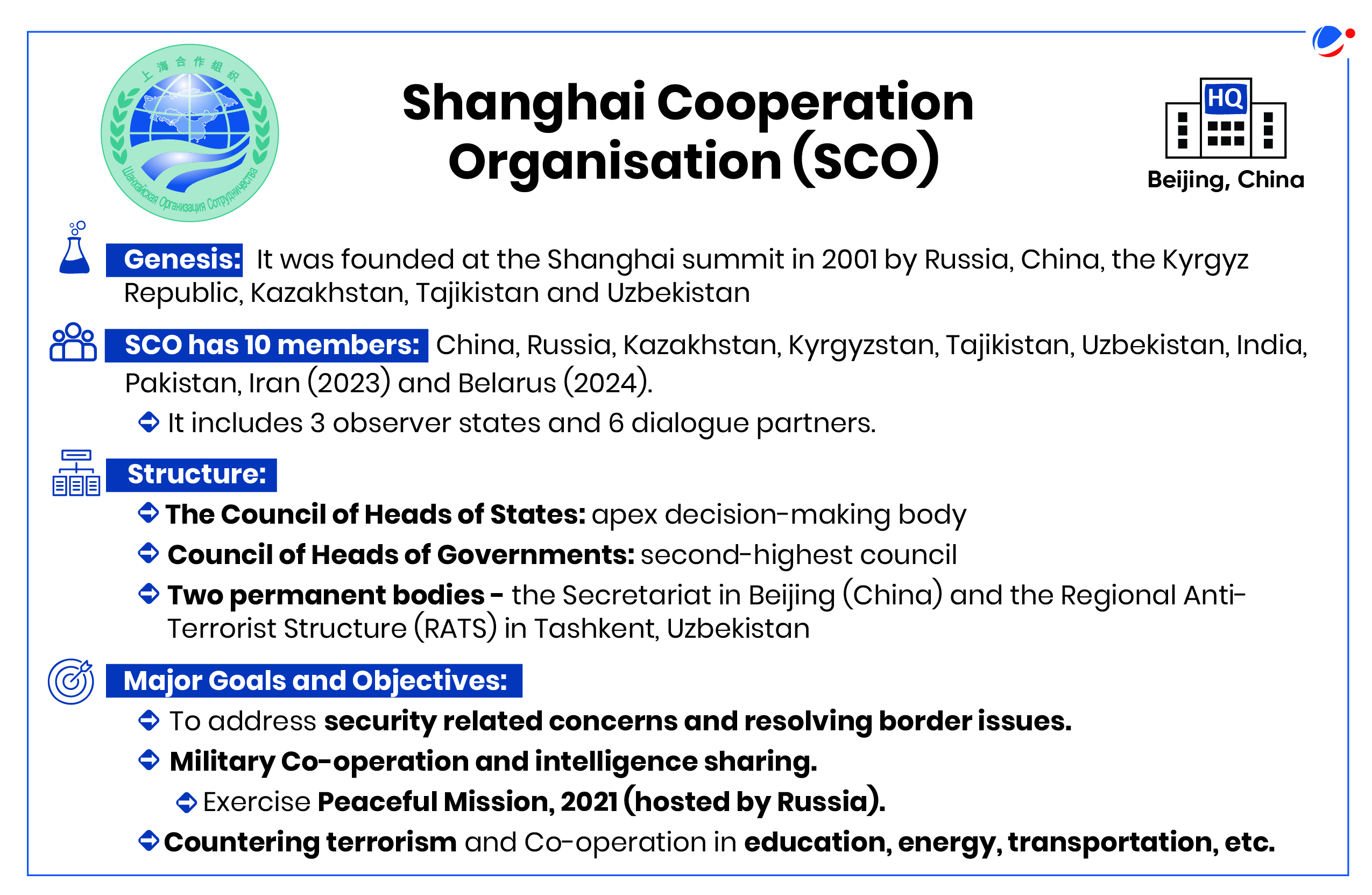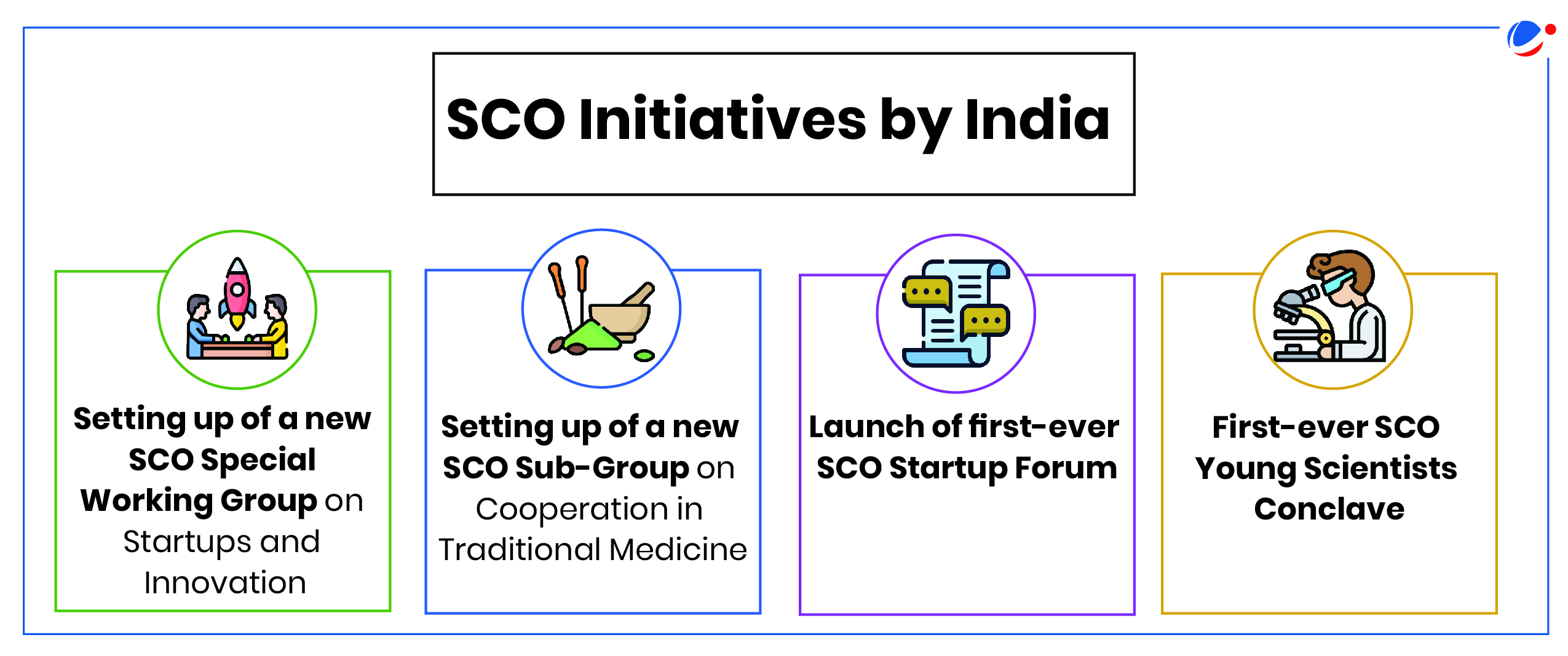Why in the News?
The 24th summit of the Council of Heads of State of the Shanghai Cooperation Organization (SCO) held in Astana, Kazakhstan, adopted the Astana Declaration.
More on the News
- The summit is titled: Strengthening Multilateral Dialogue—Striving Towards a Sustainable Peace and Prosperity.
- For the first time, UN Secretary attended the summit.
- Key outcomes of the summit:
- The Program of Cooperation in Countering Terrorism, Separatism and Extremism for 2025-2027.
- Initiative On World Unity for Just Peace and Harmony, proposed by Kazakhstan.
- E.g., Combating Drug Trafficking: SCO Anti-Drug Strategy for 2024-2029.
- Belarus becomes the 10th member of SCO.
Significance/concerns of Belarus inclusion in SCO


SCO: Role in Reshaping Global Multilateral Order
- SCO's global pivot: The SCO is 'Reshaping Multilateralism' by expanding beyond Central Asia and spreading its geographic and geopolitical reach.
- E.g., Its members already comprise roughly 23 percent of the world's economic output and 42% of its population, making it useful to Moscow and Beijing's geopolitical aims.
- SCO's challenging western structures: SCO's expanding its influence to reshape global power dynamics by promoting alternative multilateral structures.
- E.g., Turkey, a NATO member, is a SCO dialogue partner and is aspiring to become a full member.
- Filling the Security Void: SCO addresses Afghanistan's security vacuum left by NATO alliances (led by the US), in 2021.
- Afghanistan Contact Group (ACG) was by SCO created in 2005 to maintain regional cooperation with Kabul.
- Counter-Terrorism: SCO has established the Regional Anti-Terrorist Structure (RATS) to coordinate counter-terrorism efforts among member states.
- SCO fulfilling China's strategic design: China leverages SCO to demonstrate leadership, offering alternatives to US-led institutions and positioning itself as Global South advocate.
- Even Russia sees SCO as a useful forum for countering Western narrative.
- Central Asia's Connectivity Catalyst: SCO provides a platform developing corridors and infrastructure in this historically isolated region.
- E.g., INSTC, Chabahar Project.

SCO's challenges
Challenges in its expanded role
- Expansion Dilemma: SCO's enlargement, including Belarus, raises its global profile but dilutes regional focus.
- Blurs Asia Focus: SCO was instituted with the sole focus on Central Asia. Such expansion, could potentially drive members to seek alternative cooperation formats.
- Expansion fuels China's rhetoric: China use the rhetoric of expanding members and their participation as evidence that a large number of countries backed its world view.
Other Challenges
- Afghanistan Policy Fracture: SCO members increasingly engage Taliban bilaterally for individual interests, potentially undermining SCO's collective approach and effectiveness in addressing Afghanistan's challenges.
- Such engagements go against India's doctrine of, "an Afghan-led, Afghan-owned and Afghan-controlled process for enduring peace and reconciliation."
- China's multilateral power play: China aims to transform the grouping into a China-led multilateral forum for regional geoeconomic and strategic interests.
- E.g., Help BRI gain regional prominence.
- SCO having an "identity crisis": This criticism is raised that the decisions of the SCO lack the necessary executive guarantee and in result, this organisation, like the Non-Aligned Movement (NAM), has become merely a place to discuss and announce positions and views.
- Diverse Interests: Member states have diverse interests, making consensus-building challenging.
- E.g., India declaring, 'Pakistan as an epicentre of terrorism'.
India and SCO
- India was given observer status in 2005 and in 2017, India joined the SCO with full membership status.
- On the sidelines of SCO, 2024, External Affairs Minister met with his Chinese counterpart and reiterated that India-China relationship is best served by observing the three mutuals – mutual respect, mutual sensitivity and mutual interests.
- Like the BRICS, SCO is also seeking to expand to obtain greater heft for the Sino-Russian global view.
- However, India seeks to reconfigure the SCO platform into a development-focused entity rather than one with an anti-Western agenda.
- And in this regard, India strikes a balance and resist SCO becoming a Chinese mouthpiece.
India's Balancing Act and its priorities as SCO member
- Prime Minister of India did not attend the 24th SCO summit in Astana.
- Also, India, under its first-ever presidency of SCO, hosted the meeting on virtual format in 2023.
- Infrastructure: India strategically utilises and prioritises the SCO forum to improve relations with Central Asian Republics (CARs), countering Chinese dominance in regional connectivity projects.
- Terrorism: India's main priority at the SCO is to eradicate terrorism and terrorist groups from its northwest border.
- India's references incorporated into the declaration. E.g., G20 themes like One Earth, One Family, and One Future, the startup forum, and the Life for the Environment (LiFE) initiative.
- India's priorities in SCO are shaped by Prime Minister's vision of a 'SECURE' SCO.
- SECURE stands for: Security; Economic cooperation; Connectivity, Unity, Respect for sovereignty and territorial integrity; Environmental protection
Conclusion
To remain relevant, SCO must balance expansion with regional focus, foster collective approaches to challenges like Afghanistan, and navigate diverse member interests while moderating China's dominance. Strengthening consensus-building mechanisms and reaffirming shared goals are crucial for SCO's future effectiveness.



